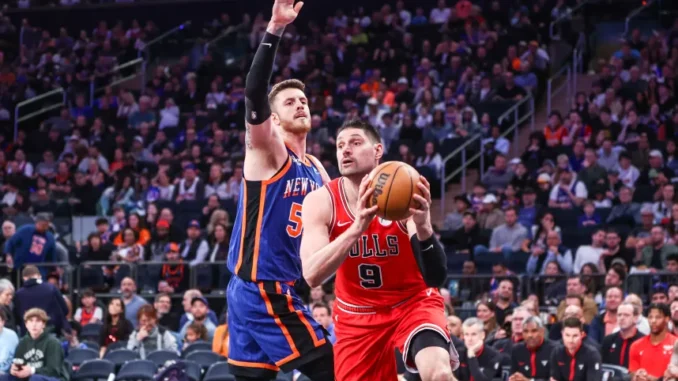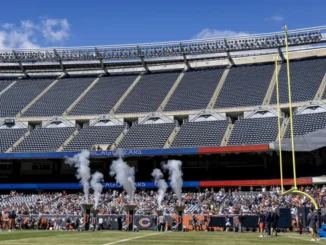
The departure of Isaiah Hartenstein from the New York Knicks presents a significant challenge for the team. Hartenstein’s departure means the Knicks are losing a player who contributed valuable rebounding, playmaking skills, and overall production. These attributes are crucial for any team, particularly in the competitive environment of the NBA.
The Knicks’ front office faced the difficult decision of not matching the three-year, $87 million deal that Hartenstein received from the Oklahoma City Thunder. This decision likely reflects considerations of financial constraints, salary cap management, and the team’s long-term roster strategy. In the NBA, teams must balance their desire to retain talented players with fiscal responsibility and the need to maintain flexibility for future moves.
Moving forward, the Knicks will need to find ways to mitigate the impact of Hartenstein’s departure. This could involve exploring trade opportunities, signing free agents, or relying on internal development to fill the gaps left by his absence. Coaches and management will also need to adjust their game plans and rotations to compensate for the loss of Hartenstein’s contributions on both ends of the court.
Ultimately, while losing Isaiah Hartenstein is undoubtedly a setback for the New York Knicks, it also presents an opportunity for the team to evaluate and potentially strengthen their roster in other areas to remain competitive in the NBA.
Isaiah Hartenstein’s departure from the New York Knicks will undoubtedly leave a notable impact on the team. His statistical contributions were significant, averaging 7.8 points, 8.3 rebounds, and 2.5 assists per game with an impressive 64.4% field goal percentage over 75 games. These numbers highlight his efficiency and versatility on both ends of the court.
Beyond statistics, Hartenstein’s chemistry with his former teammates, particularly his connection with point guard Jalen Brunson, was a valuable asset for the Knicks. His ability to play alongside a strong facilitator like Brunson facilitated effective pick-and-roll plays and overall team cohesion.
Transitioning to the Oklahoma City Thunder presents a new challenge for Hartenstein. The Thunder’s style of play is known for its pace and the heavy reliance on Shai Gilgeous-Alexander as a primary playmaker. This contrasts with his experience in New York, where he played alongside Brunson in a likely slower-paced offense.
Adjusting to a new team means Hartenstein will need to adapt not only to a different playing style but also to new teammates and coaching strategies. His ability to integrate into the Thunder’s system and build chemistry with Gilgeous-Alexander will be crucial for his success and the team’s performance moving forward.
Overall, while Hartenstein’s departure is a loss for the Knicks in terms of production and chemistry, it also signifies a new opportunity for him to contribute to the Oklahoma City Thunder in a different role and environment. Both teams will undergo adjustments as they seek to maximize their respective strengths and address any gaps left by this roster change.
The New York Knicks’ decision not to match Isaiah Hartenstein’s offer from the Oklahoma City Thunder reflects their strategic approach to managing their roster and finances. Despite potentially being willing to accept a lesser deal to remain in New York, Hartenstein was drawn to Oklahoma City’s promising roster and their established culture and style of play.
The Knicks opted to prioritize other moves, such as pursuing Mikal Bridges and extending OG Anunoby, which likely constrained their ability to match the salary offered to Hartenstein. This decision underscores the complexities NBA teams face in balancing immediate needs, long-term plans, and financial considerations under the league’s salary cap rules.
With Hartenstein’s departure, the Knicks now have a pressing need to strengthen their center position. Mitchell Robinson’s injury history complicates his reliability as a full-time starter, having played over 70 games only once in his career. This inconsistency makes it imperative for the Knicks to secure a quality center who can contribute consistently and provide stability in the frontcourt.
Finding a solution at the center position will be crucial for the Knicks as they aim to bolster their roster and compete effectively in the NBA. This could involve exploring trade opportunities, signing a free agent, or relying on internal development to fill the void left by Hartenstein’s departure and complement Robinson’s contributions.
Overall, while the decision not to retain Hartenstein presents challenges for the Knicks, it also opens up opportunities for them to strategically address their roster needs and position themselves competitively in the evolving landscape of the NBA.
The Knicks may have to make do with a less expensive option or look to the free agent market where they may sign Precious Achiuwa to fill out the forward and center positions. Walker Kessler of the Utah Jazz and Nick Richards of the Charlotte Hornets have both been connected to the team.



Be the first to comment